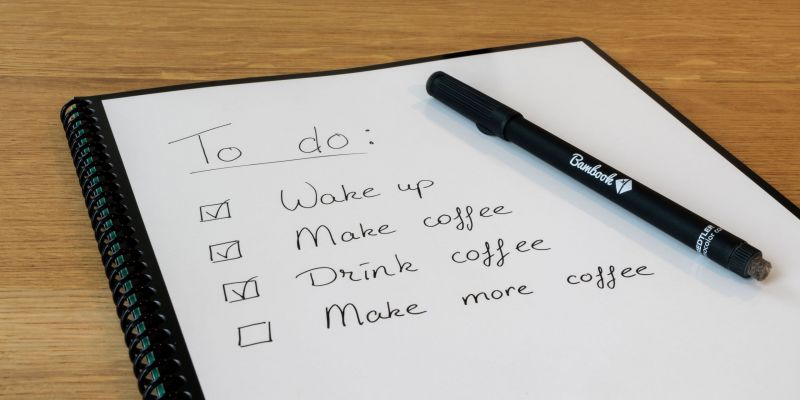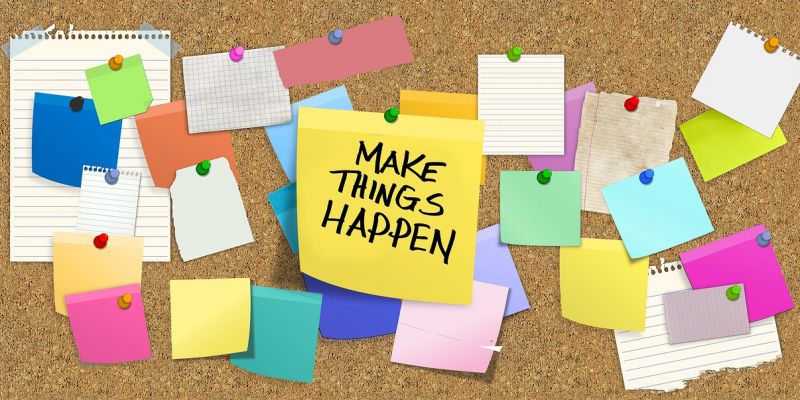
One of the most common issues that people bring to me in their coaching sessions is procrastination, because procrastination can cause of a number of different practical or emotional problems that my clients might be working with me to improve. The impact that procrastination has on my clients varies, but pretty much always includes one or more of these things:
They feel out of control, because they’re constantly “fire-fighting”: their tendency to put things off means a lot of what they need to do is urgent and that’s exhausting and stressful.
They feel generally anxious and stressed: this might be related to feeling ashamed that they can’t get on with things, an impact from ruminating over decisions they are putting off making, or because they’re feeling constantly under pressure because they know there’s things they need to do or ought to be doing that they aren’t getting on with.
Putting things off means they aren’t making the kind of progress they want with their career or their business – opportunities are being missed, they are putting off making decisions which leaves things in limbo, or the quality of work they’re producing isn’t as good as they could achieve if they had got started a bit sooner and had more time on the work. The end result is they’re feeling unsatisfied or are struggling financially.
They want to be more productive or manage their time better to improve their work life balance, but procrastinating over things means their best laid plans don’t work – the last minute fire fighting and “sudden” commitments they haven’t taken into account, mean they end up working longer hours anyway, or have to do things they don’t want to do, rather than the more attractive things they’d really wanted to do.
Sometimes, they are also experiencing difficulties in relationships with others they work with or live with, because their procrastination means others are unable to plan their work or lives with any certainty either.
What is Procrastination?
Procrastination is putting off or avoiding doing something, and it usually causes you a problem or some degree of disadvantage by putting it off (see the examples above!). As well as putting off tasks, we can also procrastinate over making decisions.
When we’re procrastinating over something, we might still be busy doing important things – an example would be putting off calling the doctor to make an appointment about something or putting off starting an essay or project report (possibly for days or even weeks), while meanwhile doing other important work or household management tasks.
Procrastinating in the moment over a particular task you’ve decided to do today might typically look like “faffing” or doing things that are neither useful nor particularly enjoyable, as we distract ourselves away from the task we have got planned – perhaps by surfing social media or writing endless lists about what we need to do. These are things that feel busy, but are really not very important and are all about delaying the inevitable start of our task.
I often hear people equate procrastinating with putting things off until the last minute, so let’s briefly also be clear about a couple of things that are NOT procrastination, because not everything that you leave ‘til the last minute and not everything you put off is procrastination.
First, and very importantly, procrastination is not laziness.
Second, if you consciously choose and plan to leave doing a task until the deadline and then get it done perfectly satisfactorily and on time, that is not procrastination – that’s simply an effective way of organising and managing your time.
If you had planned to do something and then something else unexpectedly arises that you consciously assess as being a higher priority that needs your attention instead, putting the original task off is not procrastination either – that’s simply prioritising and managing your time.
And equally, not getting round to doing things is not always because of procrastination. A lack of planning and organising skills can also result in things not getting done, or forgotten about until the last minute (or perhaps even beyond the last minute). Coaching is great for helping you develop personalised and successful organisational strategies, structures and routines that will help you avoid this.
What we’re focusing on in this blog post is the kind of delaying, putting off and avoiding getting started with something – a task or decision – that makes it hard, or ultimately impossible, to complete it in a timely or satisfactory way.

What Causes Us To Procrastinate?
In 2007 the University of Calgary did a meta-analysis of research and studies into procrastination, and found there are four key causes of almost all procrastination:
The task we’re avoiding is boring or feels painful
We may or may not be aware that what we’re trying to avoid is the pain that the task will bring. It’s common to procrastinate and put things off that we don’t want to do because we don’t enjoy them, will feel bored while doing them, or because we anticipate we will feel either physical or emotional pain of some kind (eg frustration, overwhelm, sadness or feelings of inadequacy) while completing the task.
Something to be aware of if we put things off for this reason, is that we are somehow assuming our future self is going to be different to our current self. If it’s boring today, it will still be boring tomorrow. If we’re not in the mood today, then unless there’s something very specific happening today that’s altering our mood from its normal state, we won’t be in the mood for it on any other day either!
The length of time between deciding to do something and needing to complete it is long
When something has no deadline, or the deadline is a long way off, and therefore it isn’t pressing, it initially may make sense to delay getting started, especially if you have got a never ending to-do list of other important things. But the longer we leave getting started with something once we’ve said we’ll do it, the more likely it is we will put it off. And off. And off. Sometimes altogether, if there’s no actual deadline at all.
Scheduling a first step and getting started with a project or task soon after you’ve decided or agreed to do it, makes it more likely you will then pick it back up and complete it.
A lack of self-efficacy
There are various reasons why we might not believe or expect that we can actually complete something.
We may have been given a really tight timescale to complete something, and simply believe there just isn’t enough time to do everything that’s needed before the deadline.
Or we may lack some knowledge or expertise – we may be aware that we don’t know how to go about doing the task, or don’t know how to get the information we need.
Another possibility is that we don’t have the self-belief that we, personally, are able to do this. This might be something we’re aware of, or something that’s sitting in our sub-conscious that we’re trying to keep away from (and telling ourselves we don’t have enough time, when that’s not logically true, is often a sign of this: because it’s easier to fail by running out of time than to discover we couldn’t do it).
If we think we might fail, procrastinating helps us avoid that failure. This is often the reason that people struggling with Imposter Syndrome procrastinate – and I count myself among those!
Impulsiveness
If we find it hard to maintain our attention once we’ve started something, and are easily enticed by a new, shiny task, we often find ourselves putting off getting things finished.
If we’re easily distracted, or find it difficult to exercise self-control in the face of something more interesting, exciting or even simply less boring or difficult, then before we know it we are procrastinating.
Sometimes we may become distracted as our attention is drawn away from something by something else specific that’s come to our attention (eg a phone ringing, a book we notice on the shelf next to us, an email notification that pings onto our screen).
Other times we may choose to distract ourselves because it makes us feel more interested, busy, excited or in some other way better – we call this being distracted, but actually we are just choosing to do something different that we’ll prefer.
I see all of these causes of procrastination commonly among both my neurotypical clients and those with ADHD, for whom procrastination is a particular challenge.
For ADHD brains, which work with a different kind of attention and have specific difficulties with emotional control, getting started with things that are boring or overwhelming is a particular difficulty, and impulsivity is a built-in piece of brain-wiring for some of those with ADHD, bringing significant difficulties with distractibility, self-control and organisation.
Many of the strategies for overcoming procrastination that I’m going to share next can be (and are!) successfully used to help improve procrastination by ADHDers as much as those that are neurotypical – albeit potentially in a more highly personalised way, and with some careful consideration around motivation, which neurodiversity coaching can help you explore and develop.

Strategies For Overcoming Procrastination
There are thousands of books, blog posts and training courses offering strategies that help you stop procrastinating, so how do you know what actually works?!
The truth is there is no single strategy that is guaranteed to see you overcome your procrastination: the best one to use is the one that works for you, and that is likely to be a strategy that matches the reason why you procrastinate.
Here, I’ve gathered together the broad strategies that my clients have most commonly found work, and grouped them together under the four different reasons for procrastination I’ve outlined above, to help you more easily find something that may be a match for you. And don’t forget, I’m available for coaching support if you’d like to explore strategies in a more personalised way that will deal with specific situations and challenges.
If you don’t want to read all of these, or want just one strategy to go away and try to begin with, then the single best piece of advice I have is this:
Take whatever you are procrastinating over, and break it down into a series of much smaller tasks.
This strategy counters all four common root causes, for different reasons:
- If you find something boring or painful: it makes it easier and quicker so you aren’t going to feel the pain for as long, which makes getting started less unattractive.
- If you’re tempted to delay starting because it really isn’t pressing: identifying one small thing you can do, and doing it, means you’ve started… and that makes it more likely you’ll continue and finish over time, even if there’s no deadline to complete things.
- If you aren’t sure if you can do it, or what to do: breaking it down makes it easier to do something you can do, or to identify what information or knowledge you need (and that is a step forward in itself!)
- If your self-belief is low: your confidence will build as you complete tasks that you can do, and make it more likely you’ll continue.
- If you’re feeling overwhelmed by what’s needed and you don’t know where to start: it will help you to see things more clearly, and work out what to do first
- If time feels short: having one short task to get started with and done will get things underway and help to make it feel more possible to complete.
- If you’re easily distracted or have difficulty focusing on one thing for a long time: breaking things down means you can do one specific task for a short time and then move onto something else.
- If getting started with something is habitually difficult: it allows you to identify one, small step, which is easier to get started. And getting started is often more than half of the battle when it comes to procrastination.
So what else works?
Here’s my list of strategies for overcoming procrastination.
They all work, but like other changes, will take some practice before they become habits.
So before you choose to use any of these strategies to overcome procrastination and get something done, please forgive yourself for having procrastinated, and continue to forgive yourself if you don’t overcome your procrastination perfectly every time. I encourage you to become 70% better, 70% of the time…. Just think how much more you will get done if you achieve that!
Strategies for Overcoming Procrastination When The Task is Boring or Painful To Do
When this is the reason for procrastination, the key is to find a way to get started, and that usually means making getting started easier in some way:
- Make doing it more enjoyable – listen to music you love; take it to a café where you can get a cup of your favourite coffee or a slice of cake to enjoy while you do it; buddy-up with someone else to make it more fun to complete; have the conversation while going for a walk.
- Decide exactly when you are going to do it and diary it as an appointment for yourself , rather than letting the decision about when you’ll do it drift.
- Give yourself permission to only spend ten minutes on the task, in return for starting it. If you still don’t want to do it and can’t bear to continue after ten minutes, stop as agreed – you can pick it up again tomorrow, and at least you have made some progress. (But many times you will continue once you’ve started, because the hardest part has been done)
- Determine a reward for completing it, and then reward yourself as soon as it’s done.
- If being done is more important than who does it, delegate it to someone else if you can!
- Increase your motivation: Ask yourself “what’s in it for me if I get this done?”, “How will I feel when I’ve done this?” and “what won’t happen if I don’t do this?”
- Find an accountability partner, to add a bit of pressure to get it done: this could be a family member, a friend, a colleague or a coach.
- “Eat the Frog” – do the task you least want to do right at the start of the day, get it out of the way, and feel great for the rest of the day about the fact you no longer having it hanging over you.
- Try Mel Robbins’ 5 Second Rule – deciding what you need to do and then counting down from 5 to 1 and then immediately starting it: it’s like holding your breath and jumping in, before you’ve really had a chance to think about how cold the water might be!
Strategies for Overcoming Procrastination When The Deadline Is Ages Away
- Identify the first step and do it immediately
- Plan each separate task that needs doing, and then diary each separate task as a separate appointment with yourself so you both get started and have reminders to keep going
- If you like the pressure of doing things at the last minute, work out when the last minute is to get started (rather than get completed) and make an appointment in your diary to do that, so you don’t actually leave it too late
- Create visual reminders for yourself to keep it front of mind – these could be calendar reminders, post-its stuck in the pages of your notebook or a poster you make yourself for your office wall.
- Increase motivation: Why is this important to you? What’s in it for you to get this done? Make it something you want to do, not just something you’ve agreed or decided to do, so it doesn’t eventually become something that was never important enough to start.

Strategies for Overcoming Procrastination When You’re Afraid You Might Not Be Able To Do It
- If not knowing how to do something is what’s stopping you, make gaining knowledge (or finding out where you can get the knowledge or information from) your first step, and work from there.
- Work out whether “not having enough time” is a prioritisation issue, a workload issue or an excuse that’s keeping you safe from something you’re afraid of.
- Raise your awareness about what you might be thinking subconsciously that’s leading you to put things off, so you can make a more conscious choice about whether or not you want to do this task. Ask yourself what you might be keeping yourself safe from by not doing this: this might be not having to face potential failure or not being able to be seen by others in a way you don’t want to be seen, for example.
- Talk the task through with someone you trust, to find a way forward that you feel more confident about
- Set a timer and write, without stopping, for ten minutes about the thing you are putting off. Write whatever comes into your head about it. Then read it back and see what that tells you about why you aren’t getting on with it and what you need to do.
- If you’re worried about what might happen if you do this, make a plan for how you will cope if that does happen. This can help reduce the fear and allow you to get started.
- Re-frame what success will look like with this task. Instead of success being a particular outcome, think about what you’d like to learn as a result of doing the task – and make learning that a successful outcome in itself (even if it’s just learning whether or not you are willing to do this kind of thing again in future!)
Strategies for Overcoming Procrastination When You’re Impulsive or Easily Distracted
- Remove distractions. Be ruthless – work out what distracts you and make it impossible (or far less likely) that they will be able to distract you. This might mean switching off emails, not listening to songs while you work, or leaving your phone in another room.
- Try the Pomodoro Technique – work for 25 minutes, setting a timer, and then take a short break, before doing the same again.
- Plan to alternate between different types of task, to keep things interesting, moving and motivating. This could be easy then hard; creative then thinking; interesting and then boring; written and then spoken; detailed and then big picture – whatever works for you.
- Work out when you are usually at your most focused, and consciously plan to do the things which need you to stay on-task for longer at those times. And vice versa.
- Set yourself rewards: reward yourself for staying on task until something is complete.
- Increase accountability: Get others to set you deadlines for things that need to be done, and use the additional focus that a deadline often brings to get the task done.
- Try adding some white noise into the background, or experiment with different kinds of music and sound in the background to see if there’s something that helps you with sustaining your attention.
- Each day, decide what you will do first tomorrow. Gather all the things you need together to make it easy to get started with as little thought as possible (before you become distracted by or decide to do something else).
- Diary important tasks as appointments. You can’t be distracted from something you didn’t plan to do in the first place, so plan it in to increase the liklihood of doing it – or at least be very specific about when you will do it (eg “immediately after I have eaten lunch”). Creating an appointment for something means you have to consciously decide to do something different, rather than simply drifting into something else, making it more likely you’ll do the important task you’d planned.
A Final Word On Procrastination
We all procrastinate sometimes. It’s human nature. Procrastination isn’t a problem, unless it’s causing a problem. And if it is causing you a problem, it’s something you can overcome.
As you’ll have seen in this post, there are many different strategies that can help you successfully overcome procrastination, when it needs to be overcome.
If you’d like help to develop a Get Things Done habit, to overcome procrastination over a particular goal, or overcome chronic procrastination, whether that’s associated with ADHD, fear or simply habitual procrastination, please get in touch to discuss how I can help you with that through coaching.
I’m Jo Lee, the No Stress Success Coach. I help ambitious people achieve the successful, enjoyable work life they want, without the stress, self-doubt and exhaustion they don’t. I help you make changes that mean you control your work rather than it controlling you, so you’re able to switch off, worry less, sleep better, work less and live more. So you feel balanced, not burned out.
I offer coaching remotely on Zoom or Teams, or in person from my coaching rom in North Leicestershire.




